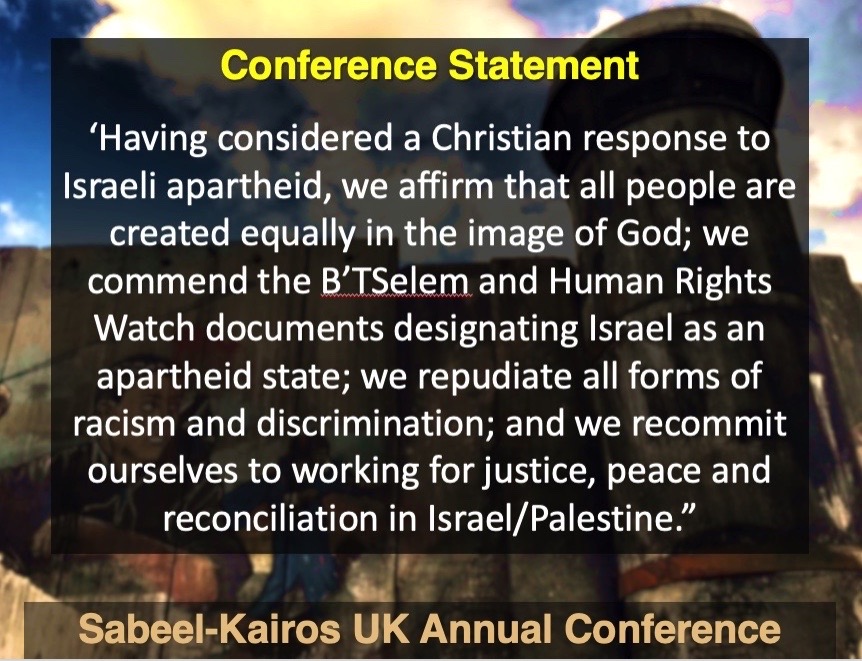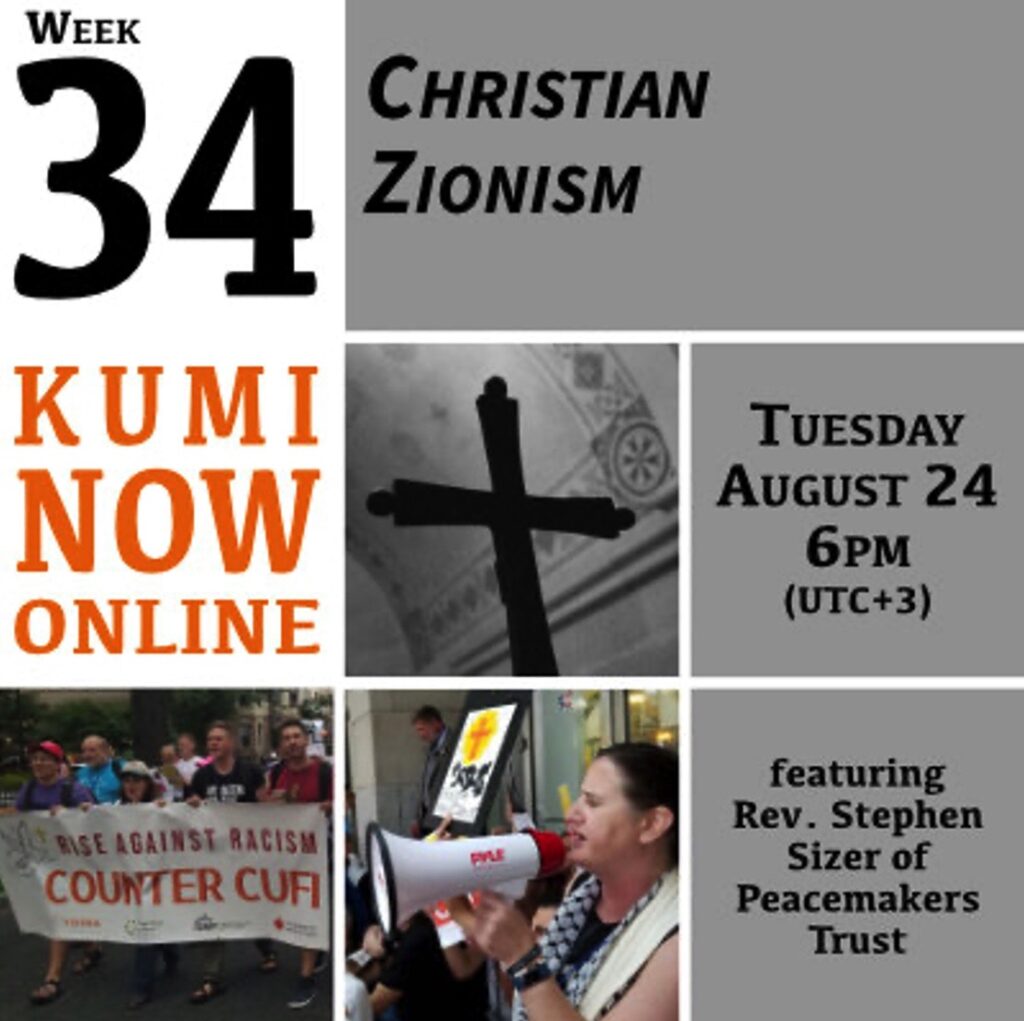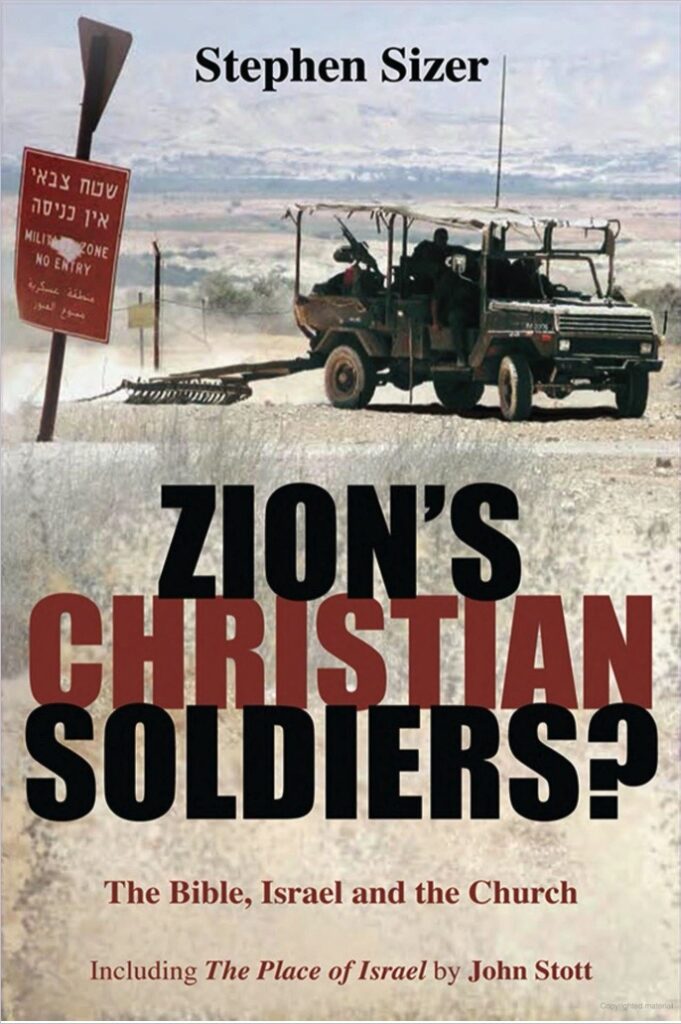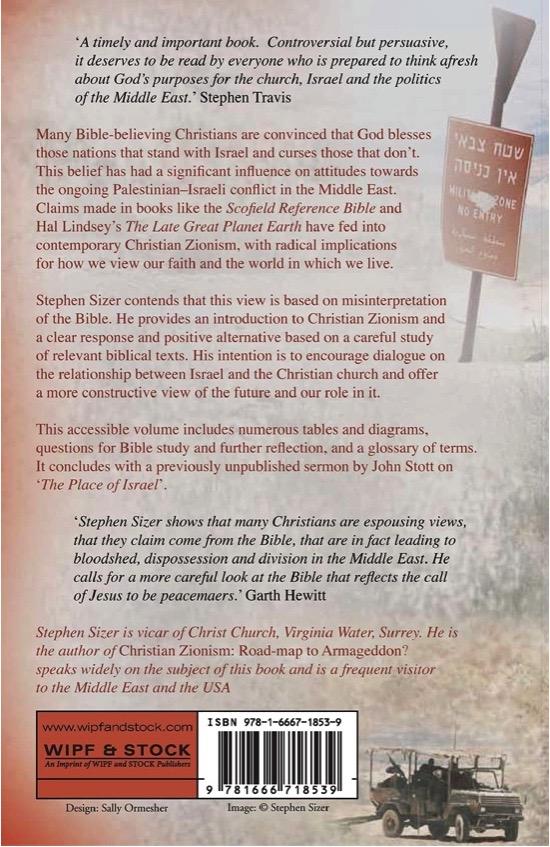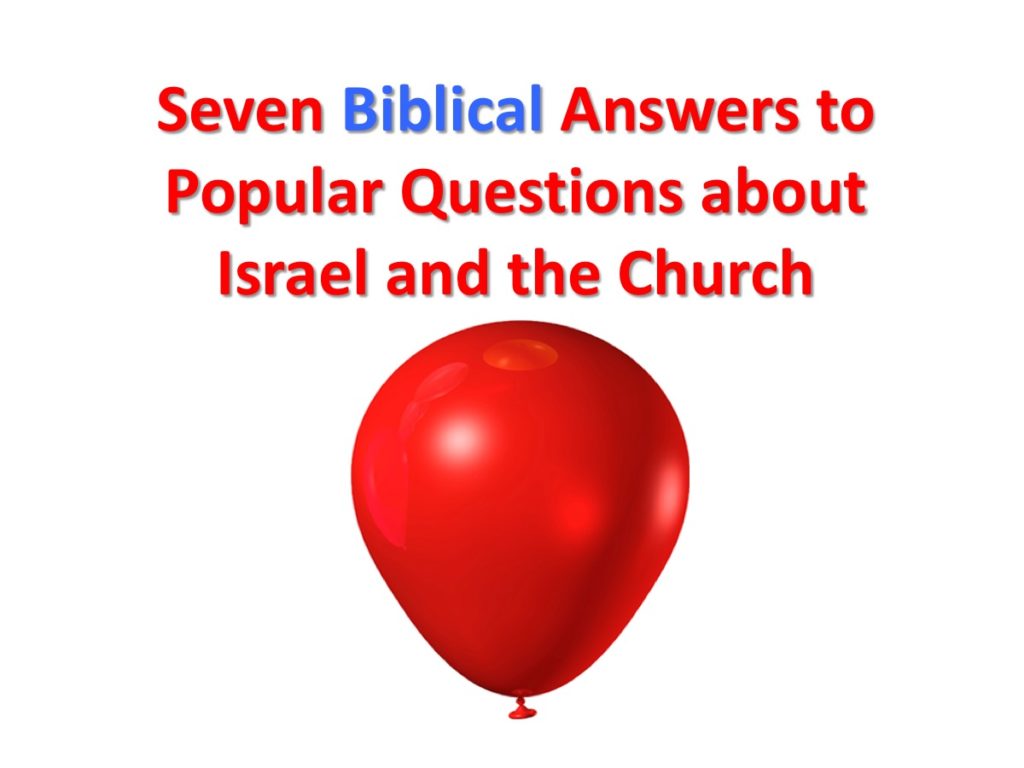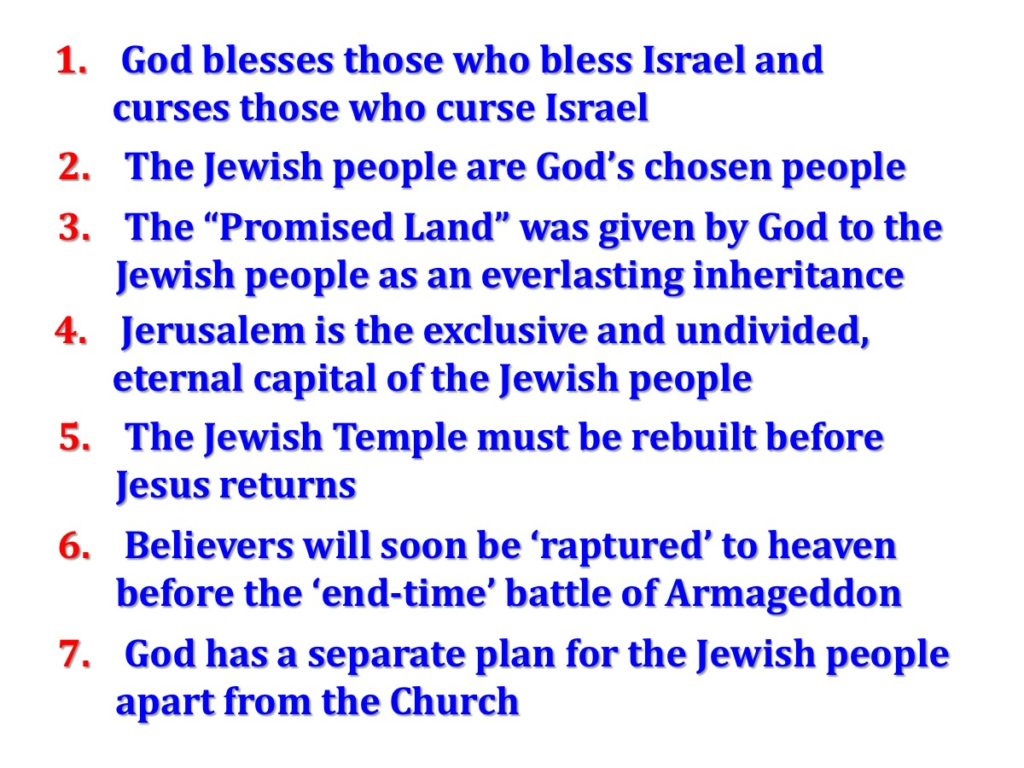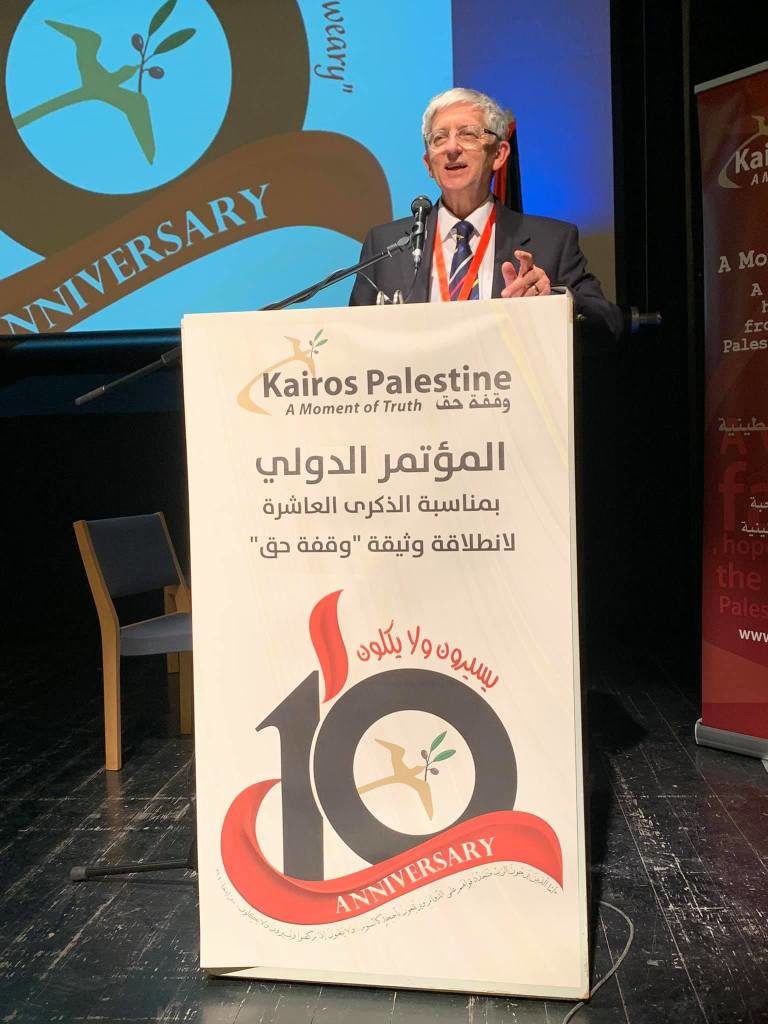 A Spanish edition of my book Christian Zionism: Roadmap to Armageddon? has been published by Bosforo Libros in Madrid, Spain.
A Spanish edition of my book Christian Zionism: Roadmap to Armageddon? has been published by Bosforo Libros in Madrid, Spain.
Foreword to Spanish Translation
I am delighted that you are reading my book in Spanish – something regrettably I cannot do – at least not yet. I wrote this book for three reasons – truth, justice and reconciliation.
My first motivation is the need to speak the truth. Jesus said, “...you shall know the truth, and the truth will set you free.” (John 8:32). Sadly the Christian faith has, for many centuries, become equated with colonialism and empire in many parts of the world. In the Middle East, this is largely due to the influence of European Christians who, nearly 200 years ago, believed it was their destiny to assist the Jewish people in colonising Palestine. This movement which became known as Christian Zionism, gave rise not only to Zionism and the founding of the State of Israel, but also to the Palestinian Nakba and the Arab-Israeli conflict. Many Christian Zionists see the coming of Jesus as the postponement rather than the fulfilment of the promises God made to the Hebrew people. Their emphasis on Israel and end-times prophecy, rather than upon Jesus and the gospel, is a distortion of the Bible.
My second motivation is justice. Micah asks, “What does the Lord require of you? To act justly and to love mercy and to walk humbly with your God.” (Micah 6:8). It is too easy and convenient for Christians to blame others, especially the Arabs or Islam for the ills of the world. The Middle East conflict is being perpetuated largely by American Christians who have popularised the notion that God blesses nations that support Israel. We must be honest about our historical complicity in the conflict and commit ourselves to working for peace with justice for all, irrespective of their race or religion, and based on the rule of international law.
My third motivation is reconciliation. Jesus is described as “The Prince of Peace” (Isaiah 9:6). He has commanded his followers to pursue a ministry of reconciliation (2 Corinthians 5). We are called to be peace-makers not widow-makers. Christian Zionism in its most extreme form is pathologically confrontational and apocalyptic about the future. It is in danger of becoming a self-fulfilling prophecy. God’s word instead tells us to “Turn from evil and do good; seek peace and pursue it.” (1 Peter 3:11). At the end of the Book of Revelation there is a beautiful image of paradise restored in which the Tree of Life bears fruit every month. We are told “And the leaves of the tree are for the healing of the nations.” (Revelation 22:2). If this is God’s view of the future, then we need no greater motivation to work for reconciliation now.
I believe that when we re-examine our history and repudiate the false ways in which some of our leaders have abused the Scriptures for destructive political ends, we will be better able to contribute to justice, peace and reconciliation in the Middle East. By the grace of God, I pray that this book will motivate you to contribute to that process.
If you find it helpful, you can access further resources, text, audio and video at www.stephensizer.com as well as read my latest blog and view my photographic gallery of the Middle East. The sequel to this book is entitled, Zion’s Christian Soldiers, and addresses in more detail, the relationship between Israel and the Church in Scripture. At the moment it is only available in English but I hope a Spanish edition will be published soon.
Sinopsis
Apenas conocido en Europa, el fenómeno del sionismoi cristiano en Estados Unidos vive en los últimos años un auge cuyas reales dimensiones podemos comprender con una sola cifra: los más de 65 millones de libros vendidos por los 16 volúmenes de la serie Left Behind, de Tim LaHaye y Jerry Jenkins, una ficcionalización de las doctrinas del sionismoi cristiano respecto a Israel y el fin de los tiempos.
Surgido como corriente milenarista en la Inglaterra decimonónica, implantado en los Estados Unidos por el pastor John Nelson Darby y crecido al calor del fundamentalismo evangélico norteamericano, el sionismoi cristiano considera que sólo cuando el pueblo elegido de Israel esté en posesión de todo el territorio comprendido entre el río Éufrates y el río Nilo (Eretz Israel, el Gran Israel, tal como lo recoge el Génesis) tendrán lugar los acontecimientos anunciados por las profecías bíblicas: el Armagedón (la batalla final) y la segunda venida de Cristo para instaurar el Reino de Dios. A falta de datos precisos, los expertos consideran que hay decenas de millones de personas en Estados Unidos que comparten estas creencias.
El sionismoi cristiano ha jugado un papel histórico determinante en la creación y sustento del Estado de Israel. Este rol se ha reforzado en el curso de las últimas décadas, y en la actualidad continúa desempeñándose de las más diversas formas, desde la presión política en Washington y el adoctrinamiento masivo a través de los medios (véanse los casos de Pat Robertson y del finado Jerry Falwell, o la citada saga de los Left Behind) a la financiación directa de la emigración judía a Israel y de los asentamientos de las ocupadas Cisjordania y Jerusalén Este.
Sionismoi cristiano: ¿Hoja de Ruta a Armagedón?, fruto de la investigación doctoral del teólogo británico Stephen Sizer, se ha convertido en el texto de referencia para todo aquel interesado en conocer el origen y desarrollo histórico del sionismoi cristiano, las razones de su identificación total con el proyecto sionistai del Estado de Israel y su decisiva influencia en el devenir cotidiano del conflicto, tanto en las altas esferas de la administración estadounidense como en su contribución sobre el terreno a las políticas de limpieza étnica y expansionismo israelíes. En definitiva, para entender en gran medida por qué la paz y la justicia parecen aún inalcanzables en Oriente Próximo.
Leer un fragmento
 Introducción
Introducción
Índice
Prólogo
Prólogo a la edición en español
Prefacio
Agradecimientos
Listado de figuras
Introducción
¿Qué es el sionismoi?
¿Qué es el sionismoi cristiano?
La importancia del movimiento sionistai cristiano
Un análisis crítico del sionismoi cristiano
1. Las raíces históricas del sionismoi cristiano
Los primeros indicios: el sionismoi cristiano primigenio
El nacimiento del sionismoi cristiano y su contexto socio-político
Los orígenes del restauracionismo premilenarista histórico en Gran Bretaña
Los orígenes del sionismoi cristiano dispensacional en Gran Bretaña
Lord Shaftesbury y la influencia del restauracionismo en la política exterior de Gran Bretaña
El cristianismo británico y su apoyo político al movimiento sionistai judío
La Declaración Balfour y la implementación del sueño sionistai
El dispensacionalismo y el nacimiento del sionismoi cristiano en Estados Unidos (1859-1945)
El antisemitismoi y el sionismoi cristiano liberal en Estados Unidos (1918-1967)
El sionismoi cristiano evangélico en los Estados Unidos de hoy (1967-2002)
La proliferación y diversificación de las organizaciones sionistasi cristianas
Las raíces históricas del sionismoi cristiano: conclusiones
2. Los fundamentos teológicos del sionismoi cristiano
La Biblia: una hermenéutica literal y futurista
Los pueblos elegidos: la relación entre Israel y la iglesia
El restauracionismo: regreso de los judíos a Sion
La Tierra de Israel: reclamando Judea, Samaria y más allá
Jerusalén: la capital eterna y exclusiva del pueblo judío
El templo: reconstrucción y profanación
El futuro: la escatología del sionismoi cristiano
La singular teología del sionismoi cristiano: conclusiones
3. Las implicaciones políticas del sionismoi cristiano
El pueblo elegido: apoyar el colonialismo israelí
El restauracionismo: facilitar la emigración de los judíos de Rusia y Europa oriental
La Tierra de Israel: apoyar los asentamientos de Cisjordania
Jerusalén: los grupos de presión y el reconocimiento internacional
El templo: identificarse con el sionismoi religioso
El futuro: rechazar los procesos de paz y precipitar el Armagedón
Las implicaciones políticas del sionismoi cristiano: conclusiones
4. Conclusiones
Observaciones acerca de la evolución del sionismoi cristiano
Variantes del sionismoi cristiano
Aspectos constructivos y destructivos del sionismoi cristiano
Evaluación crítica del sionismoi cristiano
El sionismoi bíblico y su alternativa en la teología de la Alianza
Glosario
Apéndice
Bibliografía
Índice de personas
Índice de temas
Índice de referencias bíblicas
El autor
Stephen Sizer (1953, Lowestoft) es doctor en Teología, miembro y antiguo director de la International Bible Society y miembro fundador del Instituto para el Estudio del Sionismoi Cristiano (www.christianzionism.org). En la actualidad ejerce como vicario en la parroquia de Christ Church, Virginia Water (Surrey, Inglaterra).
Asiduo visitante de Oriente Próximo y máxima autoridad internacional en cuestiones vinculadas al sionismoi cristiano y sus implicaciones teológicas y políticas en el conflicto palestino-israelí, Stephen Sizer ha expuesto sus argumentos en buen número de artículos y conferencias –en Oxford, Cambridge, Glasgow, Chicago, Yakarta, El Cairo o Teherán–, cuya culminación es el presente volumen, que sintetiza para el gran público siete largos años de trabajo doctoral en instituciones académicas.
Stephen Sizer es además autor de otros libros: A Panorama of the Holy Land (Eagle, 1998), A Panorama of the Bible Lands (Eagle, 2002), In the Footsteps of Jesus and the Apostles (Eagle, 2004) y Zion’s Christian Soldiers: The Bible, Israel and the Church (IVP, 2007).
Reseñas
 Reseñas sobre el libro (en inglés)
Reseñas sobre el libro (en inglés)
